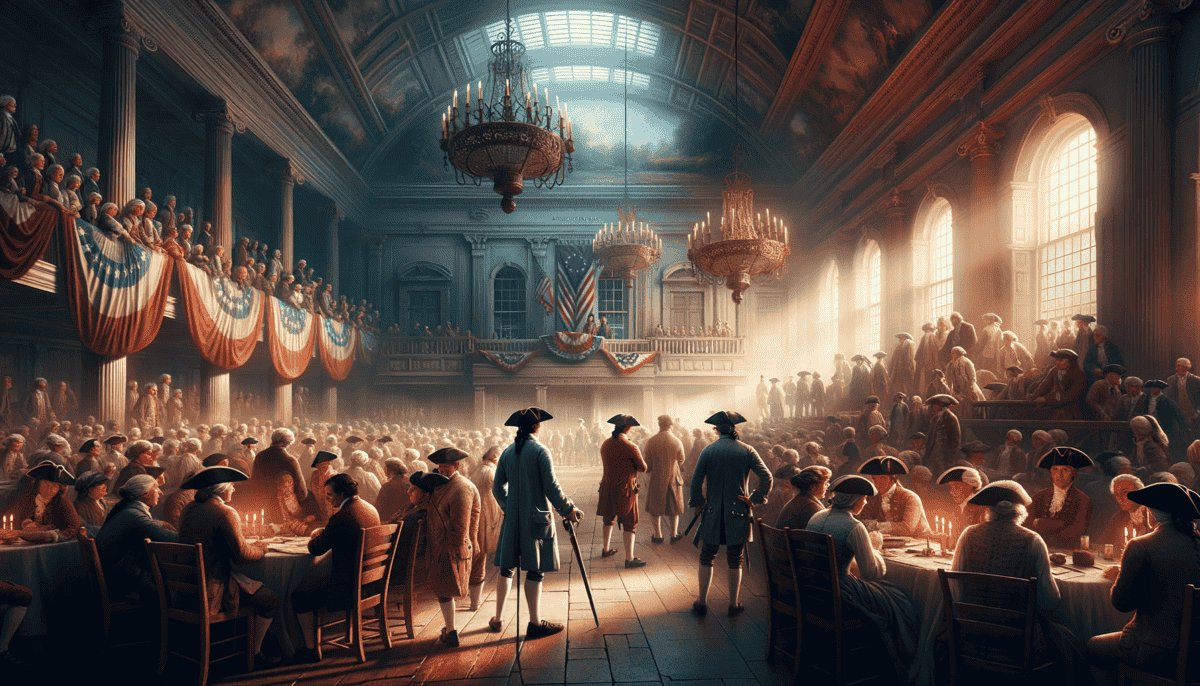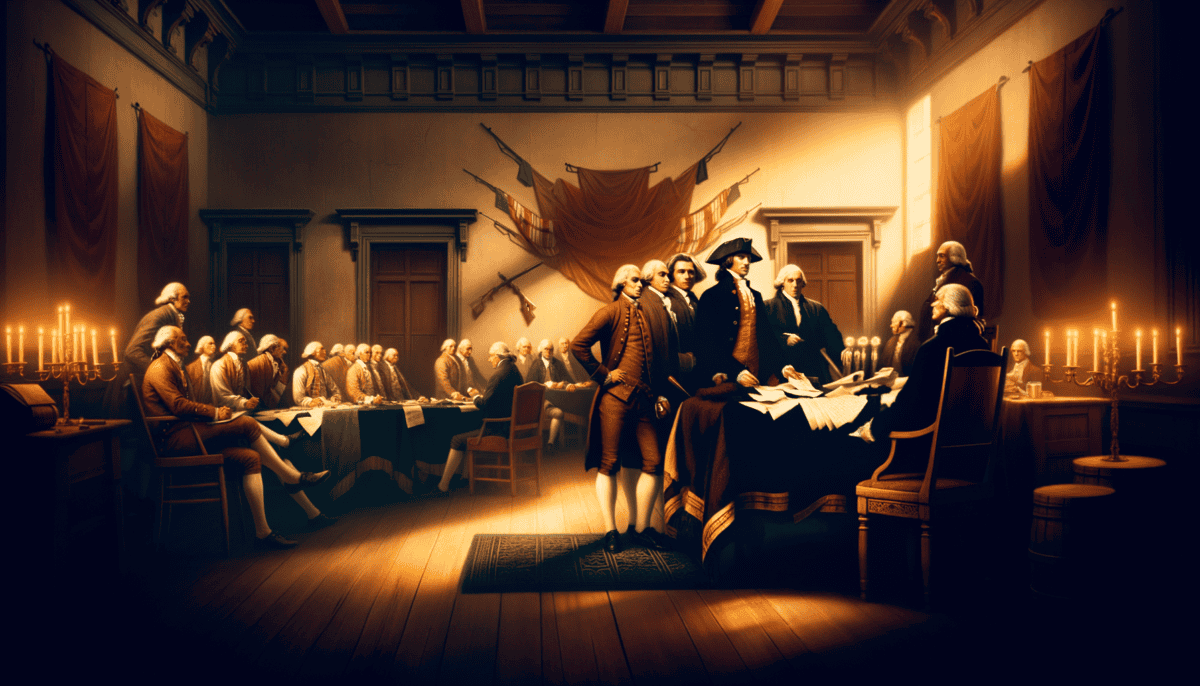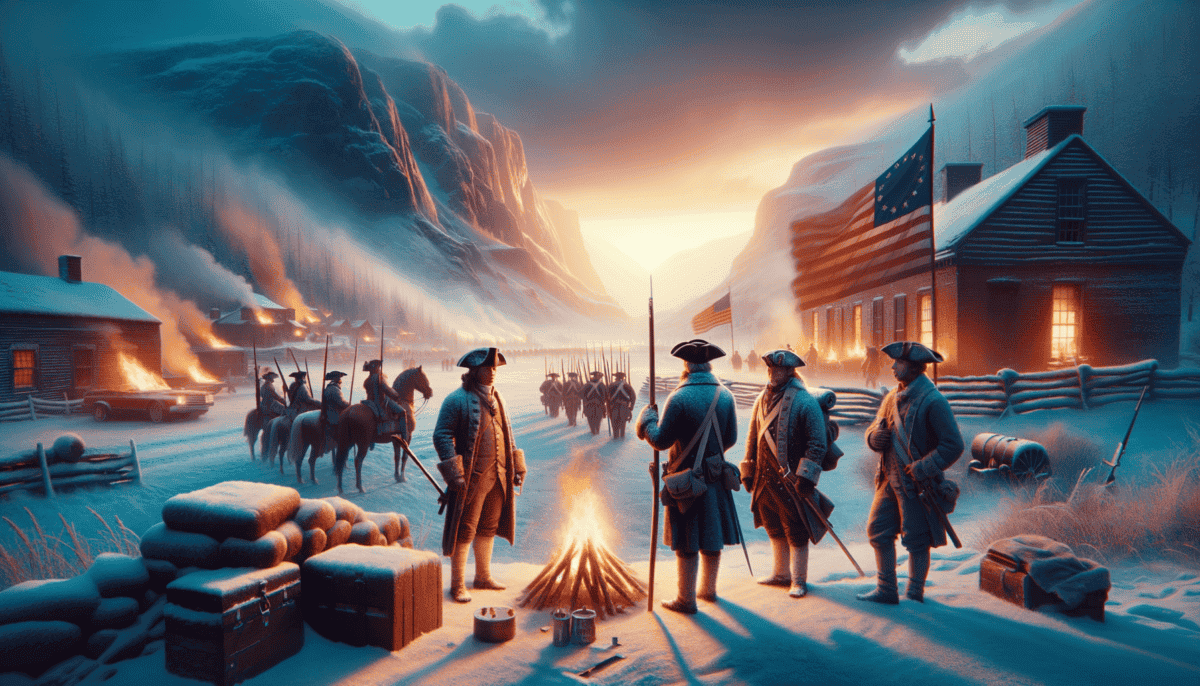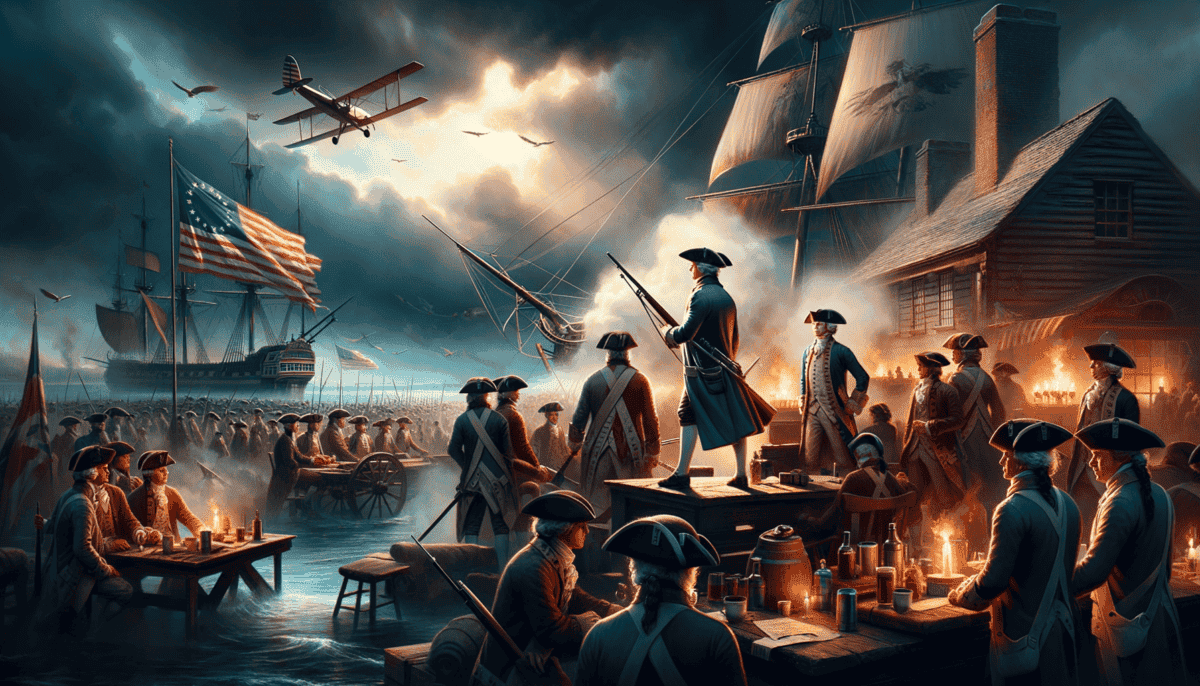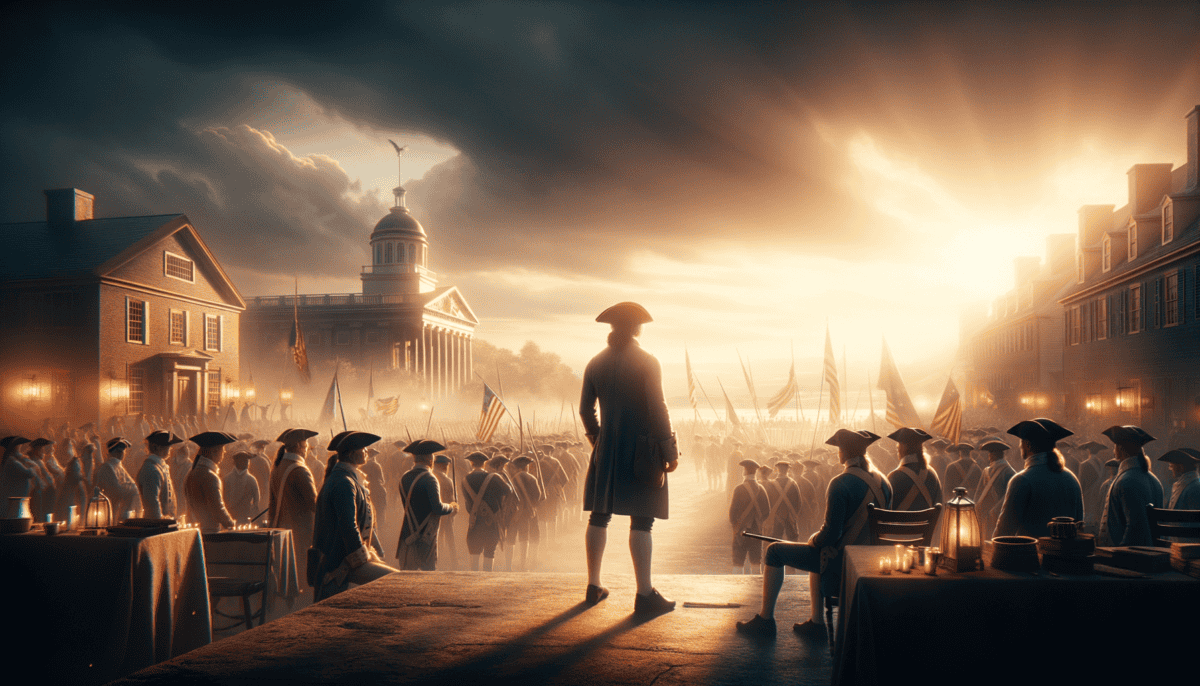Sparks of Rebellion
The cold winter air bit at Thomas Greene's nose as he swept the wooden floor of Mr. Peterson's print shop. The streets of Boston were busy with people rushing about their day. Thomas, a skinny boy with messy brown hair, looked up from his work when he heard angry voices outside.
"No more taxes!" someone shouted from the crowd gathering in the street.
Thomas pressed his face against the foggy window. He could see people waving their fists at the sky. They were mad about the new tea tax that King George had made them pay.
The British made the colonists pay extra money for tea. But the colonists couldn’t vote on these taxes. This wasn’t fair!
"Thomas!" Mr. Peterson called. "Come here, boy. I need your help with something important."
Thomas ran to his master's desk. Mr. Peterson was holding a fresh-printed paper with big bold letters at the top: Sons of Liberty Meeting Tonight.
"Take this to John Adams' house," Mr. Peterson whispered. "And don't let the British soldiers see you."
Thomas's heart beat faster. He had heard about the Sons of Liberty. They were brave colonists who stood up to the British rules. He tucked the paper inside his jacket and slipped out the door.
The streets were filled with red-coated British soldiers. Thomas tried to walk normally, but his hands were shaking. He could feel the paper crinkle against his chest.
"Halt!" a soldier called out.
Thomas froze.
"Where are you headed, boy?"
"Just… delivering a message, sir," Thomas stammered.
The soldier stared at him for a long moment, then waved him on. Thomas hurried away, his legs wobbling like jelly.
Later that night, Thomas couldn't sleep. He heard people moving in the streets below his window. Curious, he peeked out and saw men dressed as Native Americans heading toward the harbor.
Something big was about to happen.
Thomas grabbed his coat and followed them. At the harbor, he watched in amazement as the men climbed aboard three ships. They were throwing huge crates of tea into the water!
"Take that, King George!" someone shouted.
Thomas couldn't believe his eyes. This was the Boston Tea Party! He watched as box after box of tea splashed into the dark water. The air smelled like salt and tea leaves.
The next morning, everyone was talking about what happened. British soldiers marched through the streets looking angry. Thomas saw Mr. Peterson talking with other shop owners in whispered voices.
"The King won't like this," one man said.
"Good," replied another. "Maybe now he'll listen to us."
Thomas felt different after that night. He wasn't just a printer's apprentice anymore. He was part of something bigger – something that would change everything.
That evening, as Thomas cleaned the printing press, Mr. Peterson put a hand on his shoulder.
"Dark times are coming, lad," he said quietly. "We'll all need to be brave."
Thomas nodded, thinking about the tea floating in the harbor. He knew nothing would ever be the same again. The spark of rebellion had been lit, and soon it would burst into flames.
From his window that night, Thomas watched as more British ships sailed into the harbor. He could feel it in his bones – this was just the beginning.
The Call to Arms
Spring arrived in Boston, but the mood was darker than ever. Thomas watched as more British soldiers filled the streets. They were everywhere now, their red coats bright against the gray buildings.
“They’re closing the harbor!” Mr. Peterson burst into the print shop one morning. “No ships can come in or out. The King is punishing us for the tea party!”
The British made new, stricter rules called the Coercive Acts. The colonists called them the Intolerable Acts because they were so unfair!
Thomas saw people gathering in the town square. A tall man in a blue coat stood on a wooden box, speaking to the crowd. It was Samuel Adams!
“We must unite!” Adams called out. “All the colonies must stand together!”
That evening, Thomas overheard Mr. Peterson talking with other men in the back room of the shop.
“They’re forming militias,” one man whispered. “Training regular folks to fight.”
Thomas’s heart jumped. He wanted to help protect his home too. The next day, he found the courage to speak up.
“Mr. Peterson,” Thomas said, his voice shaking a little. “I want to join the militia.”
Mr. Peterson looked at him for a long moment. “You’re young, Thomas. But these are different times.” He pulled out a piece of paper. “The militia meets behind the old church on Tuesday nights. Don’t be late.”
At his first militia meeting, Thomas met other boys his age. They practiced marching and handling wooden muskets. A man named John Parker taught them.
“Stand straight, lads!” Parker called out. “You’re citizen soldiers now!”
“A farmer’s boy today, a defender of liberty tomorrow!”
Meanwhile, important men from all the colonies met in Philadelphia. They called it the First Continental Congress. Thomas printed news about their meetings in Mr. Peterson’s shop.
One night, Paul Revere rushed into the print shop. His face was red from running.
“The British are searching houses for weapons!” he warned. “Hide everything!”
Thomas helped Mr. Peterson hide their printing materials under loose floorboards. That night, British soldiers banged on doors up and down the street.
The next morning, Thomas saw his friend Billy practicing with the militia. Their wooden muskets had been replaced with real ones.
“The British won’t push us around anymore,” Billy said proudly.
Thomas nodded, but his stomach felt funny. He knew something big was coming. Everyone could feel it.
One evening, while Thomas was cleaning the shop, he heard horses galloping through the streets. Paul Revere and other riders were shouting:
“The British are coming! The British are coming!”
Thomas grabbed his coat and ran to the militia meeting place. Other boys were already there, picking up their muskets with shaking hands.
Mr. Parker stood before them, his face serious. “This is what we’ve trained for, lads. Tonight, we make history.”
Thomas held his musket tight. The wooden stock felt smooth and heavy in his hands. As he marched with the others toward Lexington Green, he remembered Mr. Peterson’s words about being brave.
The night was dark and quiet, but Thomas could hear hundreds of boots marching in the distance. The British were coming, and this time, the colonists were ready to fight back. ⚔️
A Voice for Freedom
The summer sun blazed over Philadelphia. Thomas wiped sweat from his forehead as he carried messages between important buildings. He was now a messenger for the Continental Congress!
Inside the Pennsylvania State House, men argued about the colonies’ future. Thomas saw Thomas Jefferson writing at his desk, papers scattered everywhere.
Thomas Jefferson wrote most of the Declaration of Independence with a special writing desk he designed himself! ✍️
“Young man,” Benjamin Franklin called to Thomas one hot afternoon. “Take this to Mr. Adams, please.” His eyes twinkled behind his glasses.
Thomas loved listening to the great men talk. John Adams would pace the floor, his voice booming:
“We must be free from England! We must be our own country!”
Some days were very exciting. Other delegates would jump up from their seats, shouting and waving their arms. But some days were quiet, with just the scratch of quill pens and whispered talks.
“What are they writing?” Thomas asked Mary, the cleaning lady.
“Something that will change everything,” she smiled. “They’re telling the King we want to be free.”
One morning, Thomas saw Jefferson looking tired but happy.
“It’s done,” Jefferson said softly. “Now we must be brave enough to sign it.”
The Declaration of Independence said all people have rights that nobody can take away – like life, liberty, and the pursuit of happiness.
Thomas watched as each man stepped forward to sign the big paper. John Hancock wrote his name extra large!
“Why so big?” Thomas whispered to another messenger boy.
“So King George can read it without his glasses!” the boy grinned.
After all the signing, Thomas helped carry the Declaration to John Dunlap’s print shop. They would print many copies to send all over the colonies.
The next day, people gathered in the streets. A man stood on the steps of the State House and read the Declaration out loud:
“When in the Course of human events…” he began.
Thomas watched people’s faces light up as they listened. Some cried. Some cheered. Some hugged each other.
Later that night, Thomas wrote in his journal:
But not everyone was happy. Thomas saw some people looking worried.
“The King will be angry,” one woman said. “There will be war.”
Thomas knew she was right. The British army was strong. But when he looked at the brave faces around him, he felt hope in his heart.
That evening, bells rang throughout Philadelphia. Children ran through the streets ringing smaller bells. Even dogs barked at all the noise!
“Freedom!” people shouted. “We declare our freedom!”
As the sun set, Thomas walked home slowly, thinking about everything that had happened. He had seen something amazing – the birth of a new idea, a new country, a new hope. The words from the Declaration echoed in his mind:
“We hold these truths to be self-evident…”
Thomas knew the hard part was just beginning. But tonight, Philadelphia celebrated. Tonight, they were free.
Winter’s Challenge
The cold wind howled across Valley Forge. Thomas pulled his thin coat tighter as snowflakes swirled around him. ❄️ It was December 1777, and the Continental Army was struggling.
“More soup, Thomas?” asked Sarah, one of the camp cooks. Her pot held mostly water with a few vegetables floating in it.
Soldiers at Valley Forge didn’t have enough food, warm clothes, or shoes. Some wrapped rags around their feet to walk in the snow!
Thomas nodded thankfully. Even watery soup helped fight the cold. As he ate, he watched General Washington walk among the soldiers. The general looked worried but tried to stay strong for everyone.
“Men,” Washington called out, “I know times are hard. But remember what we fight for – freedom!”
“We won’t give up, General!” the soldiers shouted back.
Earlier that month, Thomas had been at the Battle of Trenton. He still remembered the exciting victory:
But now at Valley Forge, they faced a different enemy – winter. Thomas helped care for sick soldiers in the log cabins they built.
“Tell us a story, Thomas,” croaked Jimmy, a young soldier with fever.
“Well,” Thomas began, “remember when we captured those Hessian soldiers in Trenton? They were so surprised to see us on Christmas morning!”
A man named Baron von Steuben came to help train the army. He taught them to be better soldiers, even in the cold!
Thomas watched the soldiers train every day. Von Steuben shouted orders in German while his helper translated to English. Sometimes it was funny, but it worked! The army got stronger.
“Left! Right! Left! Right!” the soldiers marched through the snow.
One evening, Thomas found a quiet spot to write in his journal:
Spring finally came to Valley Forge. The army that marched out was different from the one that had arrived. They were stronger, better trained, and more determined than ever.
“Look, Thomas!” called his friend Billy. “Green leaves on the trees!”
Thomas smiled. They had survived the terrible winter. Now they were ready to fight again.
General Washington gathered everyone for an announcement:
“France has joined our cause! They will help us fight for freedom!”
The camp erupted in cheers. Thomas felt hope growing in his heart, like the spring flowers pushing through the last patches of snow.
“We made it,” he whispered to himself. “We made it through the winter.”
That night, as stars twinkled above Valley Forge, Thomas thought about everything they had been through. The hungry days, the frozen nights, the endless training. But they hadn’t given up.
“Together we are strong,” Thomas said to the night sky. “Together we will win.” ⭐
The winds of war were changing. Thomas could feel it. As he drifted off to sleep, he dreamed of warm days ahead and victories to come.
Friends Across the Sea
The summer sun shone bright as Thomas rode his horse along the coast. The French ships dotted the horizon like giant wooden birds. It was 1778, and America had powerful new friends.
“Bonjour!” called a French soldier named Pierre, waving to Thomas. Though they spoke different languages, they had become good friends.
France sent ships, soldiers, and supplies to help America fight for freedom!
“Thomas!” General Washington called. “I need you for a special mission. Can you help us gather information about British troops?”
Thomas stood tall. “Yes, sir! I won’t let you down.”
“Be careful, my young friend. Your eyes and ears are very valuable to us now.”
Thomas remembered how far he’d come since his days as an apprentice in Boston. Now he was helping win the war!
“The British are moving south,” Thomas told Washington one morning. “They plan to attack Charleston!”
Pierre helped Thomas track enemy movements. They made a good team:
“Look there,” Pierre whispered, pointing to British ships. “They don’t know we’re watching!”
The Americans and French won important battles together. The British army started to get tired!
One day, Thomas found a wounded British soldier in the woods. Even though they were enemies, Thomas helped him:
“Here’s some water,” Thomas said kindly. “War doesn’t mean we can’t be human.”
The British soldier smiled weakly. “Thank you, lad. You Americans surprise me sometimes.”
Back at camp, Thomas wrote in his journal:
Thomas taught Pierre English words, and Pierre taught Thomas French:
“Liberty,” they said together, laughing at their different accents. “Liberté!”
General Washington called everyone together for news:
“Our armies are winning in the South! The British are getting weaker!”
Soldiers cheered and hugged each other. Thomas and Pierre jumped with joy!
That evening, Thomas sat by the campfire with his friends:
“When we win,” he said, “it won’t just be an American victory. It will be a victory for everyone who believes in freedom.”
Pierre nodded. “Oui, mon ami. Together we are stronger.”
Thomas looked up at the stars, thinking about all the changes he’d seen. From that cold winter at Valley Forge to now having friends from across the ocean. The world felt bigger somehow, full of hope.
A messenger rode into camp with exciting news: “The British army is trapped in Yorktown, Virginia!”
Thomas grabbed his spy notebook. He knew the biggest battle was coming soon. America’s chance for freedom was getting closer every day! ⭐
As he saddled his horse for another mission, Thomas smiled. The tide of war had turned, and victory felt closer than ever before.
Victory at Last
The autumn leaves danced in the wind as Thomas watched the British soldiers march out of Yorktown. Their red coats looked dull now, covered in dust. It was October 19, 1781, and something amazing was happening!
The British army was surrendering! America had won its freedom!
“Can you believe it, Pierre?” Thomas whispered to his French friend. “We really did it!”
“Oui! Freedom has won the day!” Pierre grinned, hugging Thomas.
General Washington stood tall on his horse as the British general handed over his sword:
“Today marks not the victory of one nation, but the birth of a new one,” Washington declared.
Thomas remembered his journey from Boston to this moment:
“What will you do now?” Pierre asked Thomas.
“Help build our new country,” Thomas smiled. “We have so much work to do!”
In Philadelphia, Thomas watched as leaders wrote new rules for America:
America would be different from any other country. People would choose their leaders and have important rights! ⚖️
Thomas visited his old print shop in Boston. His former master hugged him:
“Look at you now! Not just an apprentice anymore – a real hero!”
Thomas blushed. “We were all heroes – everyone who believed in freedom.”
Years later, Thomas sat with his children, telling them about the revolution:
“Did you really help General Washington?” his daughter asked.
“Yes, but the real story isn’t about battles,” Thomas explained. “It’s about people coming together to build something new.”
A letter arrived from Pierre in France:
“Mon ami, France has its own revolution now! Your American spirit of freedom has spread across the ocean!”
Thomas smiled, remembering campfires and battles, hardships and victories. America was growing strong:
- People moved west to build new towns
- Ships sailed to trade with other countries
- Schools opened to teach children about freedom
- Farms and factories helped the country grow
One spring morning, Thomas took his grandchildren to see the Liberty Bell:
“Listen,” he said softly. “It still rings with the same message – freedom for all.”
The revolution taught us that ordinary people can do extraordinary things when they work together! ⭐
Thomas touched the bell gently, remembering everything that made America free:
“Our story isn’t over,” he told the children. “Each generation makes America’s promise of freedom bigger and stronger. Now it’s your turn to help write the next chapter.”
The children’s eyes sparkled with pride and hope. Above them, the American flag waved in the breeze, its stars shining like the bright future ahead.


